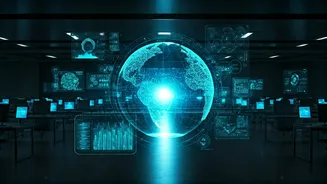Curriculum Revamps Ahead
The CBSE is set to introduce Artificial Intelligence (AI) and coding curriculum from Class 3 by 2026. An expert committee has been established to develop
and implement these subjects. This change signifies a significant shift towards technology-integrated education. Such inclusion aims to equip students with crucial skills for the future. The initiative will likely impact how subjects are taught, preparing children for a technology-driven world. Moreover, this is a response to the growing demand for tech-savvy graduates, which indicates the evolving nature of education in India. The introduction of AI and coding demonstrates a proactive approach towards aligning the education system with the demands of the modern job market, influencing future career paths.
CBSE Exam Schedules
The CBSE has already released the datesheet for the 10th and 12th exams in 2026. For students, this release is crucial as it allows ample time for preparation. Information includes the exam commencement dates, specific subject schedules, and detailed instructions for students to adhere to. With the dates now public, students can create detailed study plans and allocate time effectively. The availability of this schedule helps manage stress. The early release underlines CBSE's commitment to ensure transparency and preparedness across the board. The 2026 exam schedule details provide structure and predictability for students. This allows for better time management and reducing uncertainty during the examination period.
State Board Updates
The Meghalaya MBOSE SSLC and HSSLC timetables for 2026 have also been released, giving students in Meghalaya clarity. These schedules, including detailed dates and exam timings, aid students in creating strategic study plans. With this structure, students can prioritize their studies and effectively manage their preparation. Furthermore, the schedule release highlights the importance of standardized assessments across the state. Similarly, the Maharashtra SSC and HSC Board Exam 2026 schedules have been issued, offering details for Maharashtra students to organize their study strategies. This is a critical step in facilitating effective exam preparation and reducing last-minute stress. By providing ample time, students are able to focus more on their academic preparation.
Entrance Exam News
JEE Main 2026 Session 1 registration will begin soon, urging potential applicants to apply before November 27. This highlights the importance of deadlines, ensuring prospective candidates do not miss the chance to appear for the exam. The early announcement of the registration dates underlines the significance of time management for applicants, ensuring they are well-prepared to register. In addition, the CLAT 2026 registration deadline has been extended until November 7 for both undergraduate and postgraduate courses. This extension offers additional time for those who need it. The move gives applicants an added buffer, which supports their applications process. Finally, for those aspiring to enter the medical field, NEET PG Counselling 2025 Round 1 choice filling window opens to give aspirants time to strategize their choices, in order to get their preferred institutions.
Support for Aspirants
The UPSC is set to introduce screen reader software for visually-impaired candidates, facilitating their preparation. This change aims to make the UPSC exam process more inclusive. Such measures represent a move towards equitable testing conditions for all candidates. Furthermore, the provision of support shows a commitment to providing equal opportunity for all aspirants, regardless of disability. It underscores the value of inclusivity in professional exams. The introduction of assistive technologies such as screen readers acknowledges the requirements of candidates with visual impairments. These efforts aim at creating a fair and accessible testing atmosphere.
Economic Factors
The Delhi government is planning to create 20,000 new seats for economically weaker sections (EWS) and special needs students in schools. This initiative focuses on broadening educational access to students from disadvantaged backgrounds. The decision demonstrates the government's commitment to inclusive education policies. By increasing the available seats, Delhi's government aims to bridge educational disparities and promote equity. In addition, the Kerala government has ordered an increase in the Dearness Allowance (DA) for UGC and AICTE teaching staff. This move is to address the economic well-being of educators. These efforts highlight the significance of financial support for teachers and highlight the value of education. Moreover, this action would possibly enhance the educators’ morale and motivate them to strive further.
















